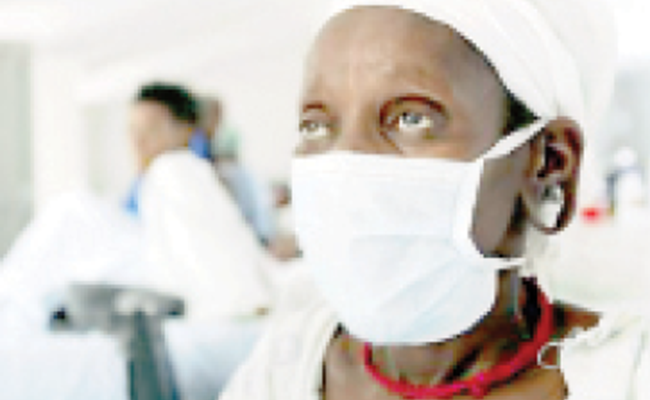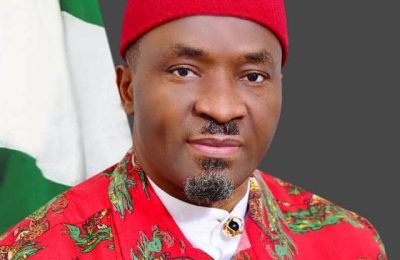Tuberculosis (TB) is curable and preventable, but it still kills at least one person in Nigeria every five minutes due to a number of factors, including, drug resistance, HIV co-infection, poverty, socio-economic factors and lack of funds, according to data.
Nigeria accounts for 12 percent of global tuberculosis cases, with 157,000 reported incidents and 47,000 deaths annually, according to the World Health Organisation (WHO). This statistic translates into one Nigerian dying from TB every five minutes. The country’s high TB burden is exacerbated by inadequate healthcare infrastructure, poverty and lack of awareness.
Despite having a cure, the disease remains a killer disease globally, with millions of deaths recorded annually.

The data showed that in 2022, Africa region reported approximately 2.4 million cases of TB, with Nigeria contributing 479,000 cases (19 per cent). Out of the 424,000 TB-related deaths in Africa same year, no fewer than 97,900 (23 per cent) occurred in Nigeria.
Tuberculosis funding gap
The National Programme Officer for TB at WHO, Dr Amos Omoniyi, said that despite accounting for high burden of the disease, Nigeria, Africa’s most populous nation, still has 70 per cent funding gap in TB stressing that the disease is preventable and can be eradicated if government at all levels can invest more into tackling it.

As part of efforts to scale up TB case finding and placing patients on treatment, the Federal Government in 2024, struck a $50million (N78.3billion) joint contribution deal with the private sector to address the huge funding gap in TB services in Nigeria.
For Nigeria to achieve the goal of eliminating TB by 2030, the Federal Government said it was crucial to collaborate with the private sector to provide direct funding to the national TB programme and also deliver financial and non-financial incentives.
The private sector is also expected to bring its expertise and advocate political commitment and investment in TB treatment and control.
Tuberculosis is an infectious disease that usually affects the lungs. Symptoms include coughing, phlegm, and more.
The Coordinating Minister of Health and Social Welfare, Prof Muhammed Ali Pate said the Federal Government will contribute $25 million (N39.1billion) to match the $25 million financial commitment made by the private sector towards the goal of fighting TB.
The minister said, “Nigeria faces a huge funding gap of USD 273 million for TB control efforts, which is 70 percent of the total TB budget of USD 388 million for 2023. Domestic contributions make up 15 percent (USD 6 million), while contributions from external donors account for 23 percent (USD 92 million).”
Funding to end TB in Nigeria
WHO data shows that global efforts to combat TB have saved an estimated 75 million lives since 2000.
About US$13 billion is needed annually for TB prevention, diagnosis, treatment and care to achieve the global target agreed at the 2018 UN high level-meeting on TB.
Ending the TB epidemic by 2030 is among the health targets of the United Nations Sustainable Development Goals (SDGs).
Omoniyi noted that despite Nigeria accounting for the high burden of the disease, it still has a 70 percent funding gap in TB.
He added that the high funding gap, the high level of donor dependency and infrastructure hinder access to essential TB services, including diagnosis and treatment.
“There have been persistent challenges in fighting this disease, and it includes insufficient funding, which is the 70 percent funding gap, low treatment coverage and limited access to diagnostic tools,” he said.
“Therefore, we are calling on the governments, civil society organisations, and international partners to increase their support and to address these barriers and enhance TB control efforts.”
Read Also: JOHESU suspends warning strike
He added that investing in TB eradication is not only crucial for saving lives but also for improving economic development, while also urging everyone to become advocates for TB awareness and to mobilise resources to combat this silent killer effectively.
He further highlighted the importance of raising awareness about TB symptoms and treatment options, emphasising the role of communities and individuals in advocating improved healthcare services.
Misdiagnosis and stigma
Maryam, a 25-year-old TB survivor, recounts her ordeal: “I was misdiagnosed for months, suffering unnecessarily. Education and awareness are crucial.”
Her story highlights the importance of accurate diagnosis and timely treatment.
Another survivor, 40-year-old Ibrahim, shared his experience: “Stigma and social isolation worsened my condition. Support from family and healthcare workers helped me recover.”
These personal stories underscore the human impact of TB.
Early detection as a veritable tool against TB
When Media EIS Fellows in training met Obed, a nurse personnel in one of the private health centres in Wuse District Hospital in Abuja, where he is currently receiving treatment to cure tuberculosis, he said his tuberculosis infection started like a joke in July 2023.
Obed said he was first given drugs to cure ulcer without concrete diagnosis for any disease but when there was no improvement, and no traces of TB, he opted for scan and was even prepared for surgery to remove lipoma from his back.
He said he was being stigmatised and people has started attributing the condition to spiritual attack as the diagnosis confirmed he is having lipoma.
He added that he later developed TB symptoms but test was negative, but was later placed on TB drugs and the lump started going down after taking TB treatment.
He also confirmed that the cough was reduced to one to two hours every evening from the round the clock routine.
Obed also realised that TB is treatable and it cannot only be contacted through smoking. He urged his close relatives to go for a test.
Happiness, who also came for TB treatment in the same health facility at Wuse District Hospital, said she initially thought she was having common cough but she was getting worried dehydrated every time.
She said her husband advised her to go to the hospital as she was taking malaria drugs without diagnosis until when she started coughing blood in December after her wedding.
Happiness, whose occupation is hairstylist in Wuse Market, said she was curious when she was referred to TB section of the Wuse District Hospital.
Devastated with TB during pregnancy, Happiness said it was not an easy task. She was made to take her husband for a test to prevent the risk of TB spread.
Ejiga Justice, who is a TB champion, said when he was diagnosed with tuberculosis, it was like the whole world came crashing on him.
He said before that time, he was working with a commercial bank in Abuja where he signed a five-year contract staff as cashier.
“I have written a conversion exam, did the interview and was waiting for a letter for posting as cash officer. Knowing what was at stake, and the fact I have lost a close person to me to TB, it was not an easy decision for me to quickly go for the treatment as suggested to me by the programme secretariat outside Abuja.
“I was sent to Doctor Lawrence Memorial in Calabar and I started a treatment there and experienced a team of professional nurses and doctors, coupled with family support. God helped me. Within four months I was discharged from the hospital to continue the remaining phase of the treatment at home.
“Returning to Abuja, I collected a letter from the secretariat to my employer to get my job back. They started exchanging mails from head office with the branch I worked.
“They later sent me to two different hospitals in Abuja and it was authenticated that my status was okay.
“But then, they could not take me back. I ran to the head official who told me point blank that they cannot take back because if another person comes down with this disease, it will be as if it was contacted from me.
“That day, I was so pained. I cried and went home to meet my wife and the five-month-old baby I could no longer provide for.
“It was a terrible experience I can never wish for anyone. It continued like that until I joined TB team in Nigeria. The TB team encouraged me, built my capacity and confidence to share my story so that it will be useful to people out there.”
He said TB was not a death sentence, adding that nine years after the treatment, he’s still very healthy.
Gender sensitive approach to tackle TB burden
According to Associate Professor in the Department of Community Medicine and Primary Health Care at Bingham University, Zankli Research Centre, Karu, Nasarawa State, Dr. Toyosi Adekeye, the TB burden in Nigeria is a complex issue and it needs to be tackled from multiple angles.
Adekeye, who is also Research Uptake Manager at Light Consortium, said the research shows that men are more likely to be affected by TB, but they are also less likely to seek care.
“We need to design policies and programmes that take into account men’s health-seeking behavior and address the social determinants of health that affect them.”
Adekeye emphasized the importance of understanding the gender dynamics of TB in Nigeria as he noted that “Men’s health-seeking behaviour is shaped by societal norms and expectations, leading them to prioritise work and income over health.”
He said government needs to develop innovative strategies to reach men and encourage them to seek TB care.
Call to action
To combat TB, experts say that Nigeria must scale up funding for National Tuberculosis, Leprosy and Buruli Ulcer Control Programme (NTBLCP) and TB research. Improving healthcare infrastructure, enhancing awareness and supporting research are also vital. Community engagement, involving traditional leaders, community groups and religious organisations, is essential.
The government should prioritise TB prevention and treatment programmes, ensuring accessible healthcare services nationwide. Individuals can contribute by donating to reputable organisations, volunteering with local health initiatives and advocating for policy changes.
- This story material is produced for the Media-EIS Fellowship Programme, a collaborative partnership among the Nigeria Centre for Disease Control and Prevention, the USAID-funded Breakthrough ACTION Nigeria and the African Field Epidemiology Network.







